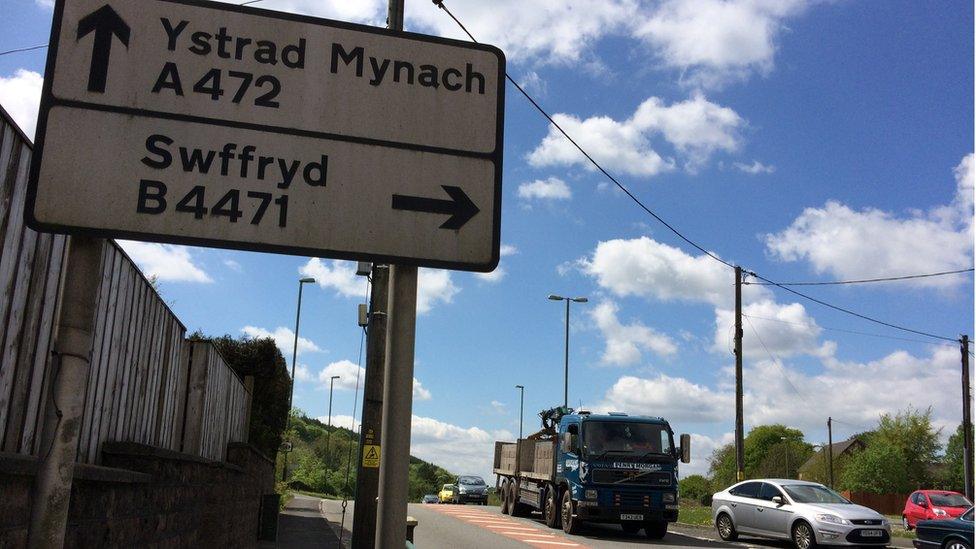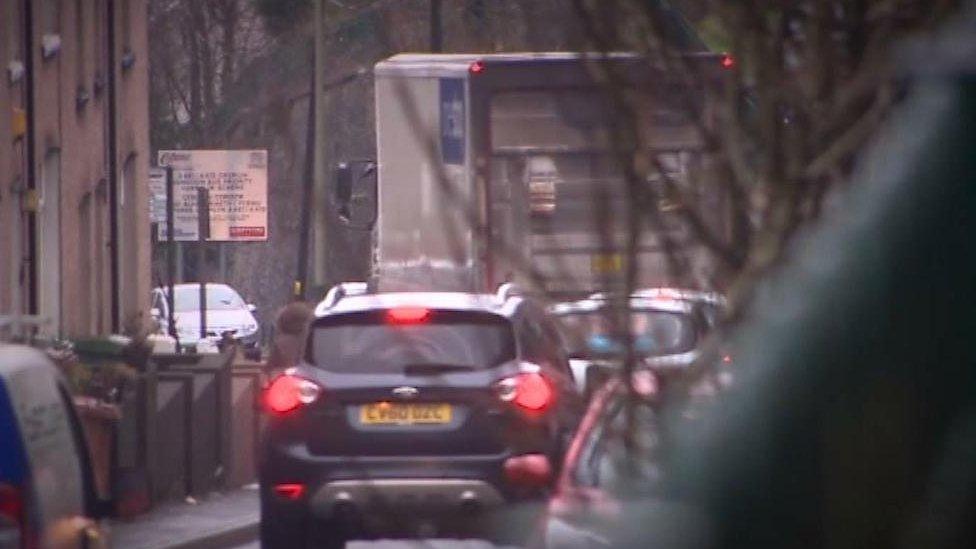Air pollution 'urgent public health crisis' warning
- Published
- comments
Caerphilly street is 'most polluted' in UK outside London
Air pollution is a "public health crisis" and needs to be tackled urgently, a health agency has warned.
Public Health Wales (PHW) said it was second only to smoking and more of a concern than obesity and alcohol.
Its figures show air pollution causes 2,000 deaths a year - 6% of Wales' total.
The most blighted areas include Hafodyrynys Road in Crumlin, Caerphilly, the UK's most polluted street outside London.
EU regulations dictate there is a level of air pollution which can be hit 18 times before breaching legal limits - and the road has exceeded it 60 times this year.
"We all know smoking is probably the number one public health priority, air pollution probably comes second to that," PHW's Huw Brunt told BBC Wales' Week In Week Out programme.
"If you talk about obesity, inactivity and alcohol, they actually come behind air pollution."

Half of homeowners on the worst-affected side of Hafodyrynys Road called on the council to compulsorily purchase their homes and demolish them because traffic is so bad.
The street leads to Pontypool, Torfaen, in one direction and allows motorists to travel towards the M4 via Caerphilly county in the other.
"We've lived here for nearly 40 years and the traffic every year you can see it getting worse," said pensioner Neil Howells, who lives with wife Dawn.
"It's just beyond a joke. I want to get away from here but how can I? I can't get another mortgage at my age. I wished they'd flatten it and give us somewhere else to go."
Mr Howells suffers from chronic obstructive pulmonary disease and says fumes make it harder from him to breathe.
He added: "Sometimes we feel like prisoners here, we can't get out."
'Harder to breathe' on polluted road says Dawn Howells
Another resident Deanna Hardwick, has two children, Daisy and A-J. She said: "A-J has been given an inhaler for when he's really bad to help him breathe.
"It's not something I want for him - I want him to be healthy - to be able to go out and play without struggling to breathe."
PHW says a contributing factor is an increase in air pollution from the number of diesel engines on UK roads after tax was reduced in 2001.
Local authorities have a duty to measure pollution levels in areas where people spend time near heavy traffic.
If a road has high levels, councils must declare it an Air Quality Management Area and monitor it, compiling action plans.
There are 41 of these across Wales, with Mr Brunt saying people who are younger, older and those with pre-existing chronic illnesses are worst affected.
"In the short term, it's the eyes, nose and throat irritation primarily," he said.
"In the long term the consequences are more serious - on the heart, lungs and there's an increased risk of cancer and other symptoms and conditions as well."
'Unique topography'
A spokesman for Caerphilly council said issues were caused by "a number of key factors".
He added: "This is a strategic cross-valley route carrying a high volume of traffic every day and the unique topography and steep gradient of the road also adds to the elevated levels of air pollution.
"We understand the concerns of residents and we are working with the local community to develop an air quality action plan."
While it said a number of options would be considered, the BBC understands one of these is the compulsory purchase of the 23 houses closest to the road.
However, the local authority would not confirm this and will discuss plans with residents on 9 March.
A Welsh Government spokesman said reducing emissions and tackling their causes would require joint working across government and public support.
"Our landmark Active Travel Act which came into force almost three years ago is an important step to help improve air quality, reduce congestion, and boost the nation's physical and mental health," he said.
"It requires local authorities to take full account of the requirements of walkers and cyclists when making investment in transport infrastructure and networks, so that we can achieve our ambition of making walking or cycling short distances the norm."
Week In Week Out: The Invisible Killer on our Streets is on at 22:40 GMT on BBC One Wales on Tuesday 7 March
- Published16 May 2016

- Published7 March 2017
